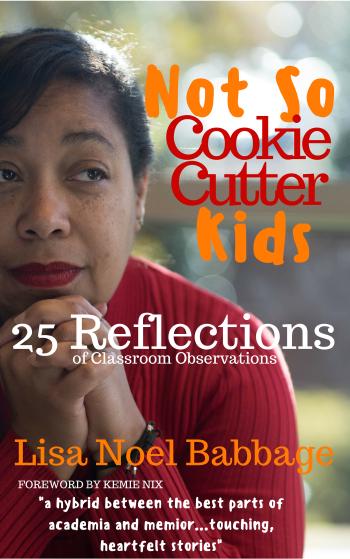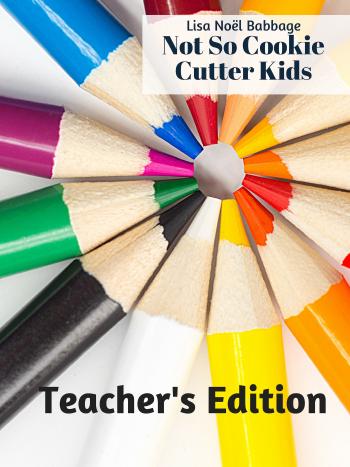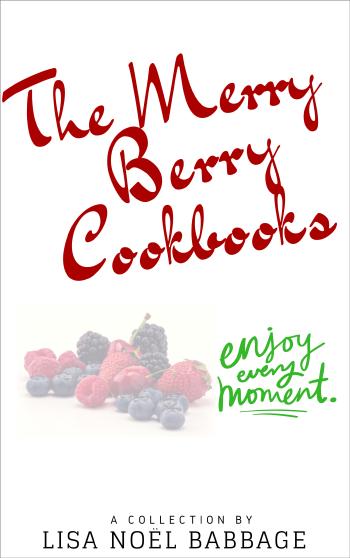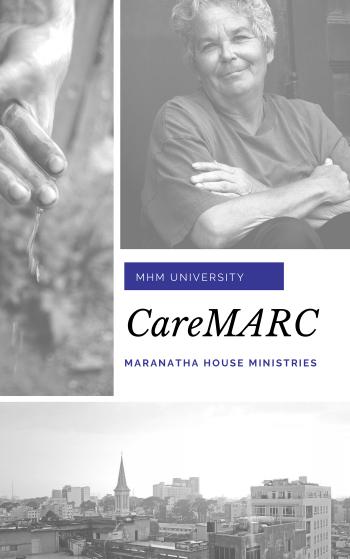Not So Cookie Cutter Kids
Academic Memoir
Not So Cookie Cutter Kids chronicles Lisa Noël Babbage’s the last year of public school teaching using self reflections as a professional practice by which she identified strategies for coping with twenty-five student characteristics. For teachers, coaches, parents, and school administrators, Not So Cookie Cutter Kids is a hybrid, a new genre that is part academic and part biographical. This academic memoir argues the basis for statistically infused self reflection, when used with in the Teacher’s Edition Bundle, to improve student performance and reduce teacher burnout.
Praise for Not So Cookie Cutter Kids
”(Not So Cookie Cutter Kids is) A necessary tool that will measure the effectiveness of your teaching style in the classroom on a daily basis.”
- Erica Billingslea-Sterling, Veteran Teacher
”…an intuitive perspective of a passionate teacher who finds a way to impact the lives of “not so perfect” children who enter classrooms every day giving us a clear lens into the challenges and successes teachers of today face.”
- Dr. Torri J. Barton-Evans, Founder, Fatherless Generation Foundation, Inc.
“Lisa Noël Babbage has given us a genuine perspective about her classroom experiences as she translates the importance of ‘Self-Reflection’ as key for balancing the pushes and pulls of teaching…”
—Jacqueline Candia, PhD (ABD), Board Certified Human Services Practitioner
“Self Reflection is the hardest kind of introspection. It causes us to be organically real with ourselves.”
— LaDetra White, Founder of Awesome Life Ministries
Foreword by Kemix Nix, Atlanta Parent Magazine
Welcome to a hybrid. (Actually, better than a hybrid.) Textbooks are necessary, but they are rarely peasant to read. They impart in depth information on a particular subject in a format accessible to students. They are to be read and studied, but never for pleasure. Academic articles have the exact same qualities as textbooks but in a briefer format. Memoirs, while sometimes painful to read because of the suffering of the subjects, aren’t designed to impart specific knowledge of an academic subject. They are far more pleasant to read.
Not So Cookie Cutter Kids is a book that combines the best qualities of both, and the whole is much better than the sum of the parts. The author, Lisa Noël Babbage, introduces us to twenty-five fifth graders with amazing insight into their personalities and what makes them tick. A major facet of each child’s personality is revealed in the title of each chapter. While the author would never use labeling as a shortcut to understanding a child, the label accompanying the individual’s name is a tool that Babbage uses to delve deeper into understanding of that child. She then introduces a variety of academic resources to bolster the understanding of both the personality traits exhibited by said child and the reader’s knowledge of such traits.
The academic resources run the gamut from textbooks to articles from professional journals to newspaper articles, but all are appropriate to the behavioral traits revealed and always geared toward both a deeper understanding of a specific child and children in general.
The cry of all children, even the shy ones, is “See me.” That is the first thing that students desire from their teachers – before other needs press forward. Babbage pays her twenty-five students the ultimate compliment of first seeing them for who they are, then meeting their needs – both personal and academic - as best she can. Bolstered by the academic resources for understanding and reaching the varied personalities and learning styles found in today’s classrooms, she starts each individual from his or her basis of knowledge - or lack thereof – and helps the child move forward in the task of accumulating more knowledge. She also works to equip them with self-knowledge and skills for surviving their sometimes quite difficult lives. Babbage’s depth of academic knowledge is great, and while she uses it to serve her students, she also reveals this knowledge to the reader who is captured, first by the vignettes of real children and then by the quoted academic articles which the teacher uses as tools of understanding. Babbage doesn’t claim success with everyone of her twenty-five children. Some she freely admits to barely budging through their difficulties – personal and academic - but all have been helped in some manner by this astute and caring teacher.
This is a unique and refreshing book that starts with real children and adds academic illustrations – unlike the common process of textbooks of citing academic knowledge first and sprinkling students in as illustrations. Because Babbage really cares for these children, they spring forth as alive with unique personalities. She cares enough to help them all in some manner; some she freely admits to helping more than Others.
And “caring” is just another word for – of course – love.
Excerpt from the introduction
“Through fourteen years in the public school arena, years training adults at the corporate level, my tutoring, coaching, and babysitting, my numerous degrees, continuing education and national level training, not even motherhood fully prepared me to reach every child in my class. Reflection has been the one constant that mimics research-in-action better than any pedagogy lecture I endured in college. Human beings, even small ones, are the most dynamic creatures on earth - to extreme degrees, we are varied and diverse and uniformly consistent. Our existence is the most fascinatingly complex permanence ever experienced. Understanding how two or more people interact is one of the greatest topics of investigation. Educators face that challenge every day.”
Index of Topics
Grief, 5 Stages of
Attention Deficit Disorder (ADD; also ADHD)
Blended Families
Debate, programs
School Climate
Adultification
Child Abuse
Self Esteem
Learned Helplessness
Truancy
Executive Functioning
Wallflower Syndrome
Looping
Self-Regulated Learning (SRL) Strategies
Low Frustration Tolerance (LFT)
Low Discomfort Tolerance (LDT)
Socratic Method
Bullying
Safe Schools Audit
Peer Pressure
Multi-generational Families
Development, Stages of
Processing, Slow
Prejudice
Nationalism
Puberty
Transience
Culturally Responsive Teaching
Brainsight
Diabetes
Dissociation, Dissociative Disorders and Trauma
Religion, Freedom of
Intelligence Quotient (IQ)
Retention, Grade
Suicide
Social Promotion
Performance Indicators (PI)
S.W.R.L. (Speaking, writing, reading, listening) Language skills
Trauma Informed Care (TIC) Strategies
Transfer Students
Mental Health, general
Death, as trauma
Theory of Language Acquisition
Response to Intervention (RTI)
Renzulli Testing
Pre- and Post- Test Data
Cognitive Academic Language Proficiency (CALP)
Insecurity
World-Class Instructional Design and Assessment (WIDA)
Problem Based Learning (PBL)
Basic Interpersonal Communication Skills (BICS)
Individuals with Disabilities Education Act (IDEA)
Single Gender Education
Maslow’s Hierarchy of Need
Achievement via Individual Determination (AVID)
Bloom’s Taxonomy of Learning Domains
Pittsburg Urban Math project (PUMP)
Multiple Intelligence Theory
Also Check Out:
Not So Cookie Cutter Kids, Teacher Edition
Academic Memoir & Professional Development workbook Bundle
A bundle combining the groundbreaking work Not So Cookie Butter Kids (Botany Bay, 2018), this teacher’s edition includes a professional development workbook that develops a step by step guide to professional self reflection. Using vignettes from the academic memoir, NSCCK Professional Development Workbook is designed for educators at any level of the organization, from kindergarten to twelfth grade as well as administrators, homeschool educators, parents, coaches, and college professors. Each section walks participants through the practice of engaging their students to promote mastery through the educator’s self reflective practices.
More →


